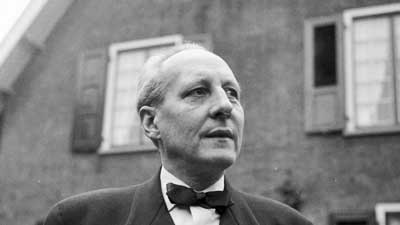指揮者:アントン・バン・デル・ホースト
Anthon van der Horst ( Amsterdam , 20 June 1899 - Hilversum , 7 March 1965 ) was a Dutch organist , conductor and composer .

He was best known for his work for the Dutch Bach Society and the performance of the St Matthew Passion in Naarden . He was also a great Bach connoisseur and enthusiast.
In 1919 Van der Horst was the first in the Netherlands to receive the Prix d'Excellence for organ in the Amsterdam Concertgebouw .
Career
In 1921 he was involved in the founding of the Amsterdamsch Muzieklyceum , where he worked as a teacher from 1922 to 1927. In 1927 he became director of the Hilversum music lyceum and in 1935 he was professor of organ at the Amsterdam Conservatory. For a few years he became chief teacher of choir and orchestra conducting. He held all these functions until just before his death. He had a major influence on at least two generations of Dutch organists. He trained, among others, Piet van Amstel, Bernard Bartelink , Simon C. Jansen , Jan J. van den Berg , Piet Kee , Albert de Klerk , Frits Mehrtens, Piet Post, Charles de Wolff , Gert Oost and Kees de Wijs . Van der Horst placed a lot of emphasis on interpretation in his lessons, based on the continuous search for knowledge about style and background of works.
Matthaus-Passion
From 1931 Van der Horst - as the successor of the sick Evert Cornelis , who died later that year - gave performances of JS Bach's Matthaus-Passion and Hohe Messe in the Grote or St. Vituskerk in Naarden every year on Good Friday . These became known throughout Europe. Van der Horst tried to get as close to the original view as possible. He directed Bach's works from a photographic representation of the original manuscript in order to be directly connected to the composer. This approach brought Van der Horst directly opposite the romantic views of Willem Mengelberg , who performed the St Matthew Passion annually on Palm Sunday in the Concertgebouw.
Van der Horst continued to conduct the St Matthew Passion in Naarden annually until shortly before his death in 1965. He himself appointed his former organ pupil Charles de Wolff as his successor.
Choirs
Van der Horst was conductor of the Royal Oratory Association in Amsterdam, the Hague Royal Singing Association Excelsior, the Leiden choir Sursum Corda and the Christian Oratory Association in Utrecht. He was also a guest conductor with the Concertgebouw Orchestra and other orchestras. With the Amsterdam Chamber Orchestra , consisting of members of the Concertgebouw Orchestra, he made various recordings. As an interpreter and connoisseur of Bach's church music, Van der Horst received an honorary doctorate in theology at the University of Groningen in 1948, with Professor Gerardus van der Leeuw as honorary promoter.
Compositions
Van der Horst wrote more than a hundred works, especially for organ - including the Suite in modo coniuncto from 1943 -, piano, choir a cappella and choir accompanied by orchestra, organ or other instrumentation, including the major works Chorus I up to and including Chorus I VIII , written between 1932 and 1961. Van der Horst also wrote songs for solo singing with organ or piano accompaniment, chamber music and orchestral works, three symphonies (the third with choir), two organ concerts, a violin concerto and some stand-alone orchestral works, such as the Reflexions sonores from 1962 and the Salutation joyeuse pour l'orchestre from 1964. His work is not experienced as simple and may therefore be performed rarely.
Biography
The Utrecht musician, composer and musicologist Gert Oost - who studied organ with Van der Horst - wrote a biography and work overview and review by his former teacher.